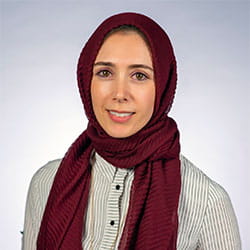Spiritual care can contribute to the treatment for all patients, assisting them through a health crisis. Hospital chaplains focus on each patient’s preferred spiritual traditions, rituals and practices. Sondos Kholaki, a board-certified staff chaplain at Hoag Hospital in Irvine, California and Muslim chaplain at Cedars-Sinai Hospital in Los Angeles, California, provides insight on spiritual care for Muslim patients.
What does a hospital chaplain do? What kind of training do they receive?
Hospital chaplains provide emotional and spiritual support to patients, families and staff of any belief systems. Some of the duties include providing prayer upon request, deep listening, exploration of existential questions, assistance in seeking inner peace and strength, facilitation of resources such as sacred texts or clergy visitation, and arrangement of rituals and religious practices.

Most spiritual care departments require chaplains to earn a Master of Divinity degree and at least four units, 1,600 hours of Clinical Pastoral Education. The Master of Divinity program provides the theory of spiritual care with a blend of courses in theology, psychology, self-development, counseling and interreligious studies. The Clinical Pastoral Education provides the practical field work application of visiting patients and receiving supervisorial and peer feedback. After the requisite education and 2,000 hours of additional clinical experience, chaplains may apply for board certification.
What are the most fundamental aspects of Islam?
Islam derives its definition from the Arabic root letters, s-l-m, which translate to peace and surrender. A Muslim, then, is one who strives to sustain inner peace and manifest outer peace by surrendering to God’s will and plan. This humility, cultivated through the Islamic rituals, underscores the optimal state of a believer. The most fundamental aspect of Islam remains the belief in One God, who has no partners, intermediaries nor offspring, and with whom all things and affairs originate and to whom all things and affairs return.
What should providers know about Islam to better serve patients of that faith tradition?
Muslims will vary in their adherence, interpretation and experience. Country of origin, cultural preferences, ethical contexts, family dynamics and many other factors should be considered. Always ask the patient and family about their religious needs and preferences. Also, providers may benefit from self-reflection to assess for implicit biases, asking questions such as: Where do you get your information on Islam? Do you know Muslims? Has your experience been positive or negative? How does that influence your caregiving?
What do you think is the most unique aspect of Islam?
According to the Prophet Muhammad, the distinct characteristic of Islam is haya’, or humility and respect with God and His creation. One of the main ethical principles of Islam is to “do no harm.”
What are some of the religious traditions, rituals and holidays?
- Ramadan (April 12 – May 12, 2021): a month in length of fasting, prayer, reflection and community.
- Eid ul Fitr (May 12 -May 13, 2021): a celebration marking the end of Ramadan.
- Eid ul Adha (July 19 – July 23, 2021): a celebration marking the end of the Hajj pilgrimage, which commemorates the story of Abraham.
- Ashura (August 18 – August 19, 2021): marks the day that Moses and the Israelites were saved from Pharaoh by God creating a path in the sea; also the tenth day of the Islamic calendar. Shia Muslims demonstrate deep mourning on this day as it marks the martyrdom of the Prophet Muhammad’s grandson.
The dates of these holidays change every year because the Islamic calendar follows the lunar cycle.
The most important rituals and traditions for practicing Muslims include the daily salah (ritual prayer), Jumua (Friday congregational prayer), Hajj (pilgrimage to Mecca), fasting (during Ramadan and other sacred seasons), and almsgiving (acts of virtue).
What is the added value of spiritual care for all patients?
The presence of chaplains contributes significantly to a patient’s overall well-being and a hospital’s commitment to whole person care. Spiritual care improves the patient’s overall satisfaction with their treatment and quality of life indicators, while contributing to decreased readmission rates. As an integral part of the interdisciplinary team at the hospital, chaplains train to understand the breadth and depth of religious, spiritual and cultural diversity of individuals. Religion and spirituality remain the top mechanisms of coping and healing; chaplains provide the expertise to help individuals identify, connect to and derive strength from their practices toward facing some of the most challenging chapters of their lives.
How can chaplains support physicians? How may they work together?
While physicians commit to treating the physical body, chaplains focus on the healing of the spirit/soul, thereby contributing to the holistic care of an individual. Chaplains often serve as an important bridge between physicians and patients and their families when considering treatment plans, goals of care and ethics decisions. Chaplains may provide support and compassionate presence at family meetings and difficult updates.
Also, chaplains remain available to support physicians and other staff members experiencing compassion fatigue, burnout or moral injury. Physicians and chaplains may work together just as any other interdisciplinary team member by collaborating on care plans for patients and maintaining open and regular lines of communication. Physicians benefit from reading chaplain’s spiritual assessments in the chart notes and may invite chaplains to present on self-care, secondary trauma, grief and bereavement, or spiritual care basics for clinicians. Chaplains may provide support during staff debriefings following a major event.
What are some ways that providers can uniquely care for Muslim patients?
Many Muslims value hospitality, a provider may take on the role of a humble student and ask the family what they need or prefer for spiritual support. Whenever possible, connect the family to a Muslim chaplain or Muslim resource from the local community.
